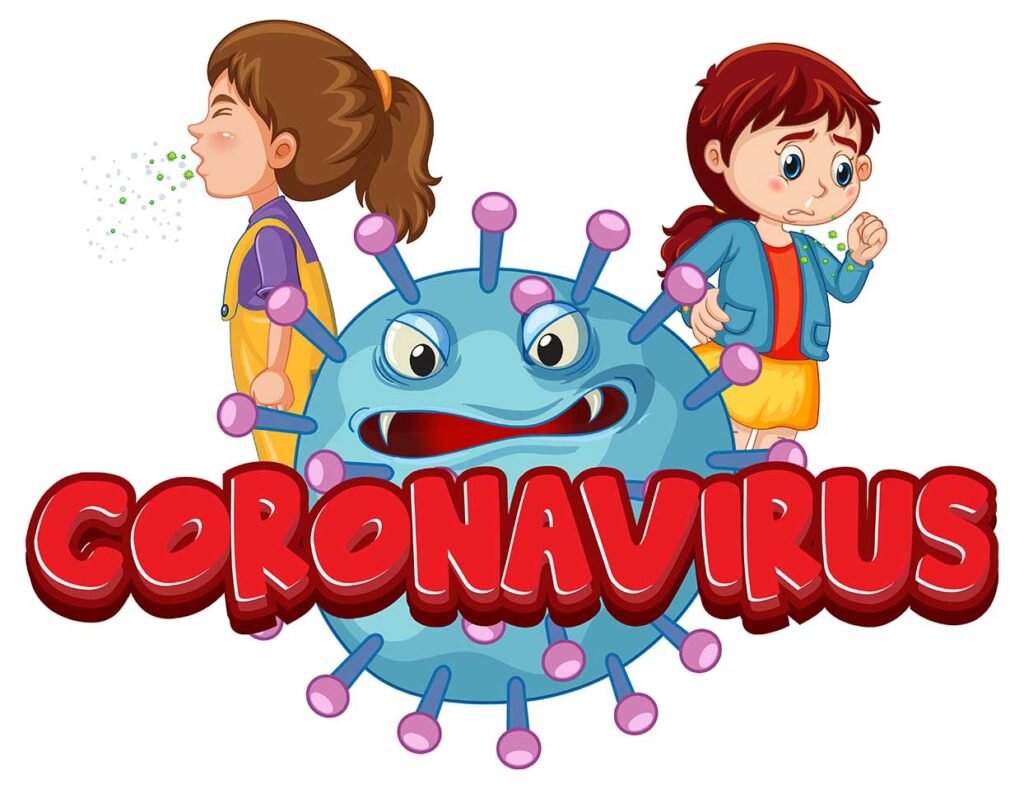Doctors have noticed covid-19 cases surge in kids : symptoms and its preventive measures , more children under 15 years old are getting sick with Covid-19. They may have a high fever, cough a lot, and have diarrhea. Even though kids usually don’t get very sick from Covid-19, parents should still take steps to stop the virus from spreading.

A child with any of the following conditions should not go to school: cough, cold, stomach flu, or flu. They should also get Covid-19 test . Currently covid cases increased in kids who already have medical conditions like diabetes , shortness of breath or heart disease. In these cases, parents should keep a close eye on their child’s symptoms and should take medical care as there kids are on higher risk.
Kids should get vaccinated if possible .They should always wash their hands. Kids aged 5 and older should wear a mask. Viral infections like RSV, flu, adenovirus, and Covid-19 can easily make kids sick, so it’s important to protect them.
Covid-19 Cases Signs and symptoms
In recent times, children under 15 years old are getting Covid-19, but the cases are not severe. Symptoms of Covid-19 in kids are like flu or adenovirus, including high fever, cough, headache, body ache, fatigue, and runny nose. Adenovirus also causes watery eyes, but Covid-19 causes swollen lymph nodes and gradual fever.
It’s not easy for parents to tell the difference between Covid-19, adenovirus, and RSV since their symptoms are similar. Children should see a doctor right away if they experience any of the following symptoms:
– Sore throat
– Cold
– Coughed or sneezed
– Diarrhea
– Vomiting
– Abdominal pain
– High-grade fever of 103 degrees or more.

Covid virus VS Adenovirus
Dr. Rohit Kumar Garg is an expert in infectious diseases at Amrita Hospital in Faridabad. He explains that flu viruses like SARS CoV-2 and influenza cause respiratory illnesses, while adenovirus, a DNA virus, can cause various illnesses, including respiratory infections, conjunctivitis, ear infections, gastroenteritis, hepatitis, myocarditis, and meningoencephalitis.
The symptoms of these viruses include fever, sore throat, runny nose, cough, body aches, fatigue, shortness of breath, and diarrhea. It can be difficult to tell them apart just by looking at their symptoms.
Dr. Vikas Maurya, Director and HOD of Pulmonology at Fortis Hospital Shalimar Bagh, says that respiratory viruses have similar symptoms, such as sore throat, cough, low-grade fever, mild body aches, and fatigue. Flu symptoms usually last for 2-3 days, and children usually recover quickly.
Covid-19 can cause mild symptoms such as low-grade fever, runny/stuffy nose, dry cough, slight body aches, mild gastrointestinal symptoms, and abdominal issues. Adenovirus illnesses share many of the same characteristics as influenza, but can additionally cause inflammation of the eye, ear infections, inflammation of lymph nodes, and digestive issues. In severe cases, adenovirus can lead to bronchitis, pneumonia, and even affect the nervous and GI systems, causing meningitis and encephalitis.
Signs of severe covid in children
Dr. Pal recommends that parents should keep a close watch on their children’s symptoms. If their child has a fever that lasts more than five days, a cough that gets worse, seems tired, finds it hard to breathe, or has more severe diarrhea or dry lips, it could indicate the need for hospital care.
Dr. Garg explains that some patients may get very sick and develop pneumonia. Symptoms such as a long-lasting fever, a severe cough, trouble breathing, low oxygen levels, and fast, noisy breathing may indicate severe illness.

Preventive measures for kids
Dr. Pal advises parents to protect their children from Covid by teaching them to wear masks, wash their hands frequently, and maintain good hygiene. Parents should also take an RT-PCR test if their child shows symptoms. If children are sick, they should stay home from school, and social gatherings should be avoided to prevent overcrowding.
Dr. Maurya suggests that schools should take precautions, such as sending sick children home and requiring masks. They should also encourage healthy habits like eating a proper diet and practicing good hygiene. These small steps can help minimize the spread of infection.
Dr. Pavithra explains that the increase in Covid cases in India is due to the crowded environment and long-lasting respiratory infections. Although the new variant XBB 1.16 can easily infect people, it does not directly impact the number of hospitalizations.

Booster campaign needed
Dr. Pavithra suggests starting a Covid booster campaign that would be given annually, similar to a booster shot. The booster shot is especially important for people who are more vulnerable to the virus. Most people have already received two doses, and some have even received a booster shot. To reduce the number of people carrying the virus, people need to be encouraged to get the annual vaccine as soon as it becomes available.
This will help protect those with weaker immune systems, such as people with other illnesses, those taking immuno-suppressive medications, transplant patients, pregnant women, and those who cannot get vaccinated yet. The importance of getting vaccinated needs to be emphasized, and the number of infections and severe cases can be reduced by decreasing the number of people who can transmit the virus.
ALSO READ HEALTH
